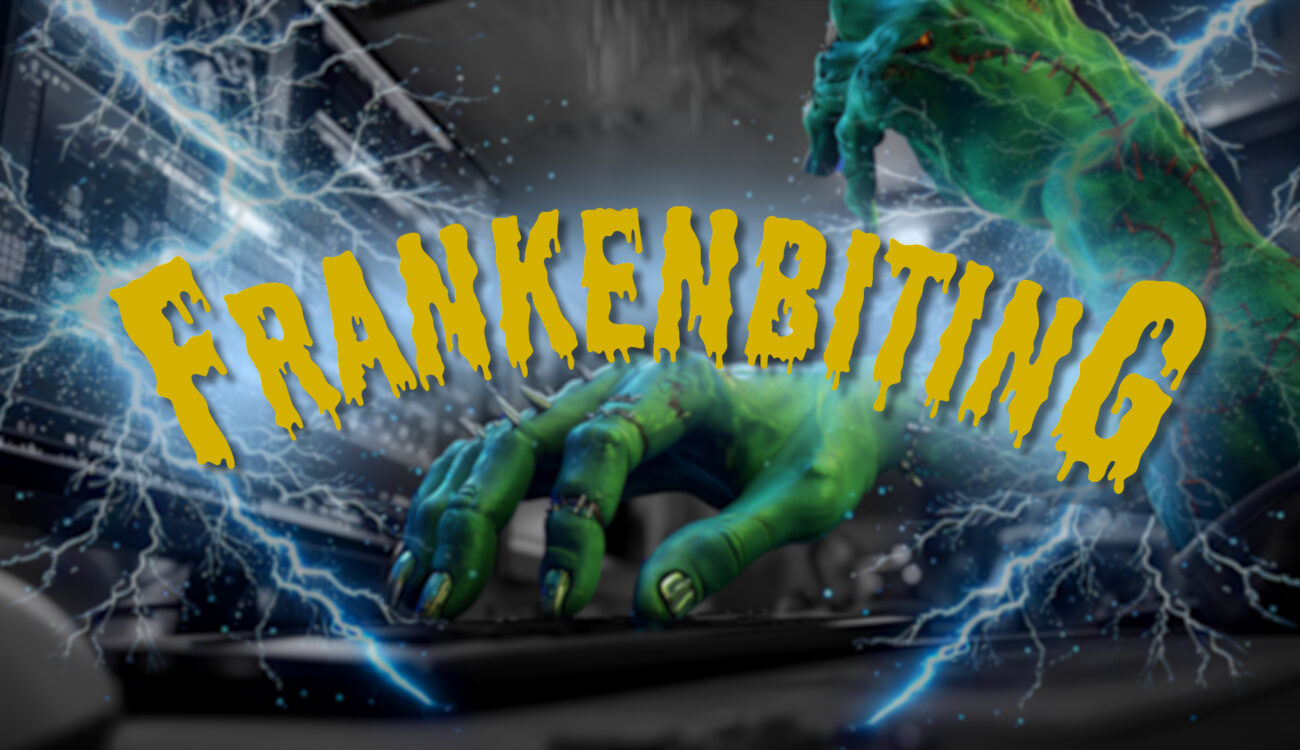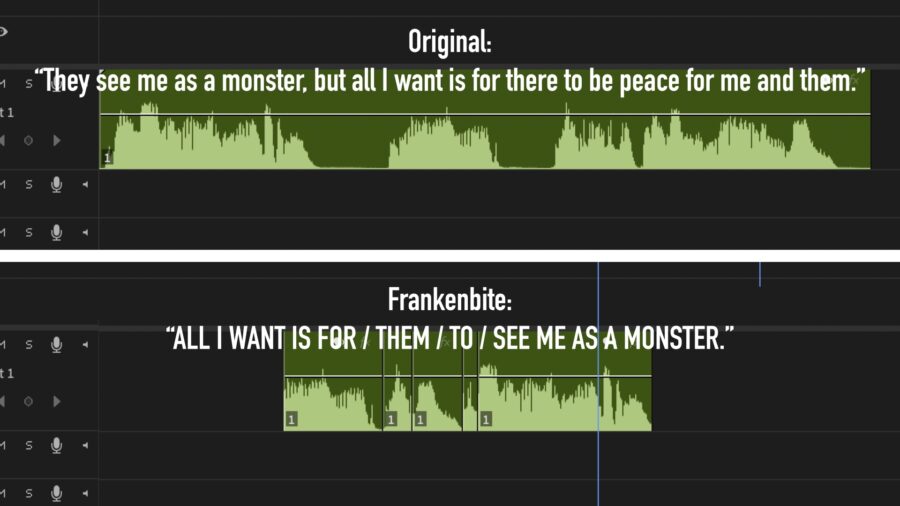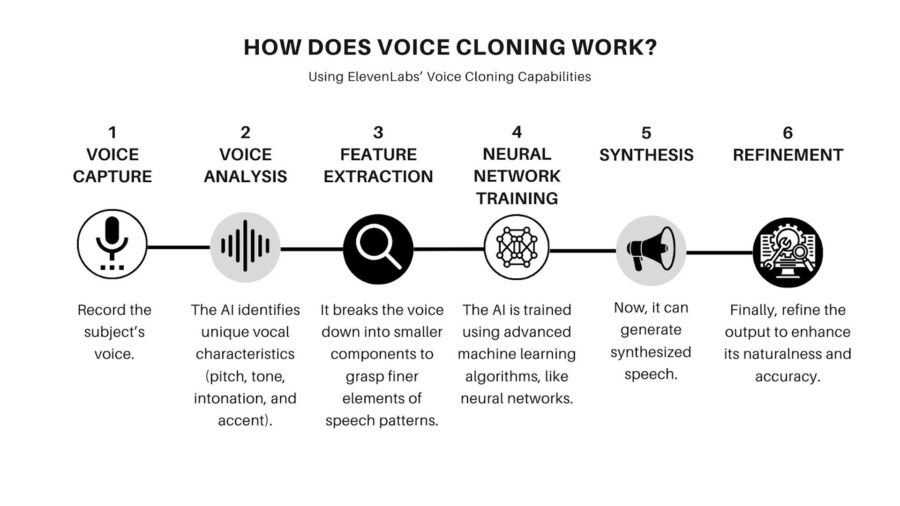
In post-production, editors rely on creative techniques to turn raw footage into compelling narratives. One such method is called Frankenbiting, where editors stitch together dialogue audio fragments to create a seamless new story. B-roll footage often hides the cuts, so audiences may not detect the edits.
Frankenbiting is popular in reality TV, documentaries, and news segments. It can compress time, enhance drama, or clarify chaotic scenes. Yet, when overused, it raises ethical and legal questions around manipulating a person’s statements.

As an editor, I’ve noticed a growing reliance on Frankenbiting. I have personally worked on more than a few documentary series that have relied entirely on Frankenbiting – the entire episode being nearly just a montage of rearranged audio snippets that sound continuous. Even fragments of words are sometimes spliced together to create statements that interview subjects never actually said. These edits are often made at the direction of story producers.
Producers favor Frankenbiting because it cuts costs. Shorter interviews, faster production, and fewer filming days all save money. However, this approach places editors in positions that can feel misleading.
Advanced Editing with Davinci Resolve

The many uses of Frankenbiting
Frankenbiting serves multiple purposes in post-production. When used thoughtfully, it can improve scene flow significantly. Common uses include:
- Clarifying Conversations: Removing pauses or combining statements helps create concise dialogue.
- Creating Drama or Tension: Reality TV uses Frankenbiting to heighten conflict, shaping events that may not have unfolded that way.
- Shaping Character Arcs: By piecing footage together, editors can give participants a defined role, even if the footage doesn’t naturally tell that story.
While effective, Frankenbiting blurs the line between editing and manipulation.

The ethics of overusing Frankenbiting
Delivering a polished narrative from chaotic footage is challenging. Yet excessive Frankenbiting shifts the true meaning of a participant’s statements. Even if those newly created statements are technically true, they could create false impressions that harm reputations.
Producers may argue that Frankenbiting is just part of the business, a “necessary evil” for crafting stories under tight deadlines. But this work is also labor-intensive and adds pressure to post-production schedules.
Saving money, but at what cost?
For documentary production teams, Frankenbiting cuts expenses by allowing:
- Shorter interviews that rely on post-production fixes.
- Fewer prep and filming days since every detail doesn’t need capturing perfectly.
- Accelerated schedules that save on crew and equipment costs.
This strategy may work for budgets, but it increases editors’ workloads without added consideration. The ethical implications are also significant. While production budgets are real constraints, twisting a subject’s intent can cross ethical lines.

The added labor of Frankenbiting for editors
Frankenbiting isn’t just a quick fix in post-production. It can add many hours to an editor’s workload. Crafting a seamless narrative often means combing through lengthy transcripts to find snippets of audio that work naturally together. Each sentence or phrase must be carefully matched, edited, and re-ordered to maintain a sense of continuity. This painstaking process involves hours of trial and error, re-listening, and refining each splice so that viewers won’t detect any unnatural shifts in the subject’s words or tone. Extra time is rarely given to account for this increased effort in post-production.
A skilled field producer can help alleviate this burden by guiding interview subjects to say things in a way that aligns with the story. Experienced producers know when to re-ask questions multiple times or in different ways. This encourages interviewees to provide responses that editors can use directly. The process can take hours in the field, but it significantly reduces the need for heavy manipulation in post. On top of that, it preserves the authenticity of the subject’s voice.

Frankenbiting vs. AI voice cloning
AI voice cloning is a technology that replicates a person’s voice, generating new audio that sounds like them, even for words they haven’t spoken. But unlike Frankenbiting, AI voice cloning faces scrutiny over concerns about consent, potential misuse, and the risk of misrepresenting a person’s intent or words.
Both reshape a person’s words, but AI generates entire sentences while Frankenbiting splices real audio. Both techniques can alter the original message, blurring the line between authenticity and manipulation.
Tools like ElevenLabs offer realistic voice cloning, which could allow editors to clarify statements and enhance story flow without the labor-intensive cuts of Frankenbiting.

Artlist also recently added AI voice generation (not cloning) to their list of features; read more about it here.
Legally, both practices are gray areas. Contracts may grant producers editing rights, but at a certain point, manipulation does become misrepresentation. Is AI voice cloning really any different than Frankenbiting when it comes to reshaping what someone says?
For me, Frankenbiting is more labor-intensive and ethically no different from voice cloning. If AI voice cloning ever becomes acceptable for documentary series or reality TV, I’d welcome the efficiency it brings.
However, as these techniques become easier and more commonplace, the industry may need clearer guidelines. I suspect Frankenbiting would face the same scrutiny as AI voice cloning if only viewers realized how much it is being used.
What do you think about the practice of Frankenbiting and AI voice cloning? Share your thoughts in the comments below!




























